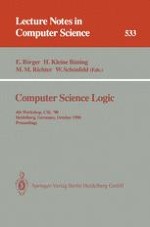1991 | Buch
Computer Science Logic
4th Workshop, CSL '90 Heidelberg, Germany, October 1–5, 1990 Proceedings
herausgegeben von: Egon Börger, Hans Kleine Büning, Michael M. Richter, Wolfgang Schönfeld
Verlag: Springer Berlin Heidelberg
Buchreihe : Lecture Notes in Computer Science
Enthalten in: Professional Book Archive
